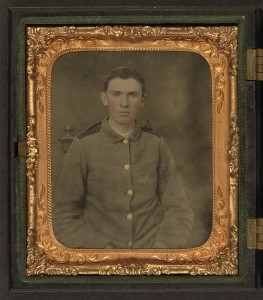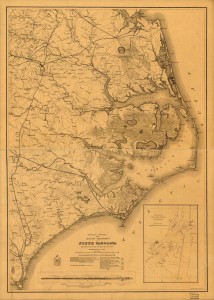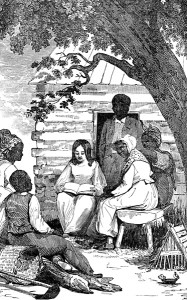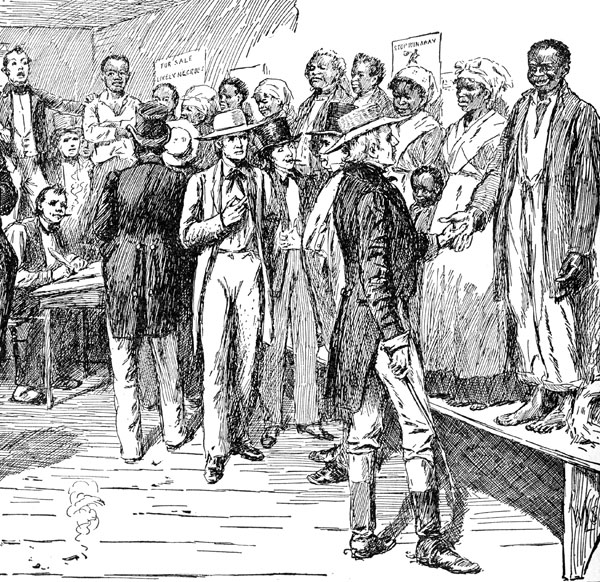From a Seneca County, New York newspaper in August 1865:
A large number of Union soldiers in North Carolina have made up their minds to stay in that vicinity and are marrying the widows and girls and settling on the abandoned plantations.
The population of Newbern, N.C., before the war was only 6,000; it is now 30,000 – the largest in the State. The health of the city was never better than at present.
A Gotham newspaper published a similar statement about the health of Newbern, but said the northern influx was due to a new emigration. Also, Newbern- New York commerce was going to get faster. From The New-York Times August 17, 1865:
From North Carolina.
NEWBERN, Saturday, Aug. 12.
The Northern emigration to North Carolina has already set in. People are arriving by the thousands from all quarters.
The health of Newbern and the rest of the State was never better. In point of health, North Carolina has always been the second State in the Union, which position she is destined to keep.
The Murray line of steamers which run from this point to New-York, and also the Goodspeed line, are each building a number of first-class packet steamships, to run on this route, which will make a trip two hours sooner.
HOUGH & Co., of this city, intend to build a similar class of steamers for the Newbern and New-York trade.
These steamers are to be constructed with the view of speed, and a rivalry is being excited that will test the skill of the first mechanics in the country.
The arriving Yankees found that children in North Carolina had been taught a biased view of the world. Earlier in August the Times front-paged an article about the Old North State, including some lessons from a Confederate schoolbook. Published in 1863, Marinda Branson Moore’s The Geographical Reader, for the Dixie Children covered the world. Here are a couple of the excerpts published in The New-York Times August 13, 1865:

‘train up a child’ (“Private W.T. Harbison of Company B, 11th North Carolina Infantry Regiment” Library of Congress)
Confederate School Books What They Contain Their Influence on the Uprising Generation.; THE UNITED STATES. SOUTHERN CONFEDERACY.
RALEIGH, N.C., Sunday, Aug. 6, 1865.
The effects of the revolution, which has swept from the South the vestige of barbarism, so long a disgrace to our flag, are quieting down, and, so far as possible, the people are returning to their old customs and habits. But the prejudices, which exhibited themselves so freely before the war, are not dead yet — in fact, they have in many instances been increased. Time was when children were taught to love the United States; but during the war the little Confeds learned lessons filled with hate against their Northern brethren. In proof of this statement I extract the following sweet little morsels of rebellious teachings from the Geographical Reader for Dixie Children; Mrs. M.B. MOORE, Authoress. Second edition: BRONSON & FARROR, Publishers, Raliegh, N.C., 1864: …
In the year 1860, the Abolitionists became strong enough to elect one of their men for President. ABRAHAM LINCOLN was a weak man, and the South believed he would allow laws to be made which would deprive them of their rights. So the Southern States seceded, and elected JEFFERSON DAVIS for their President. This so outraged President LINCOLN that he declared war, and exhausted nearly all of the strength of the nation in a vain attempt to whip the South back into the Union. Thousands of lives have been lost, and the earth has been drenched with blood; but still ABRAHAM is unable to conquer the ‘rebels,’ as he calls the South. The South only asked to be let alone, and to divide the public property equally. It would have been wise in the North to have said to her Southern sisters: ‘If you are not content to dwell with us longer, depart in peace. We will divide the inheritance with you, and may be a great nation.'” …
The Southern people are noted for being high-minded and courteous. A stranger seldom lacks friends in this country. Much of the field work is done by slaves. They are generally will used, and often have as much pocket-money as their mistresses. They are contented and happy, and many of them are Christians. The sin of the South lies not in holding slaves, but that they are sometimes mistreated. Let all little boys and girls remember that slaves are human, and that God will hold them accountable for treating them with injustice. …



